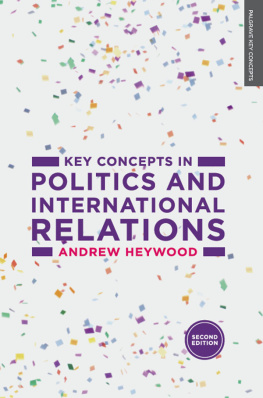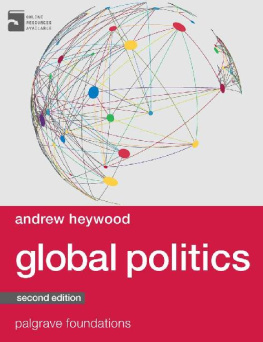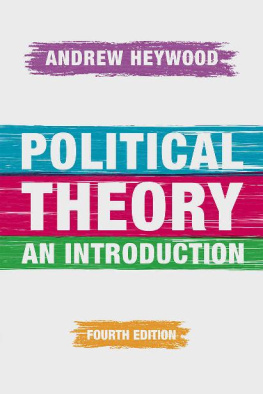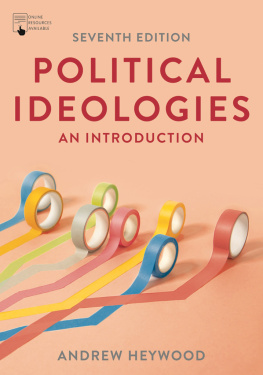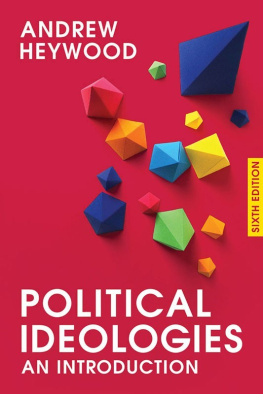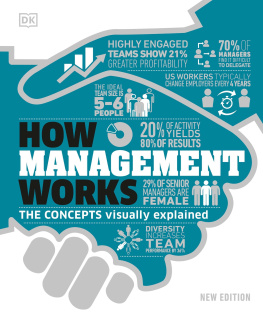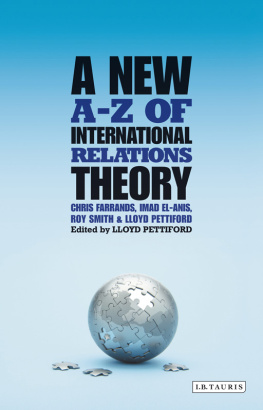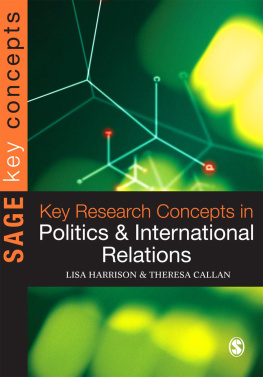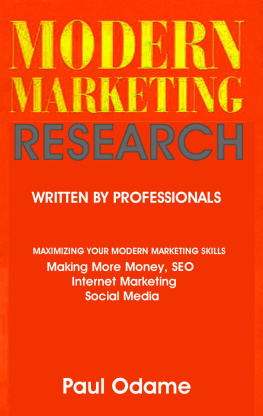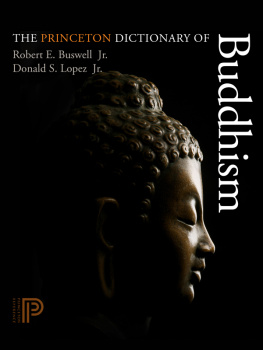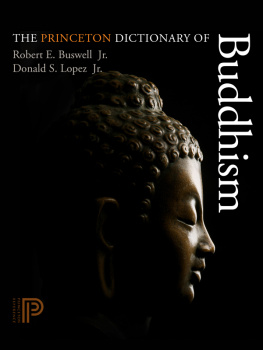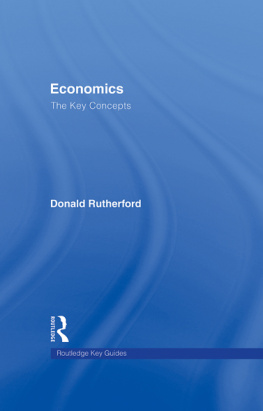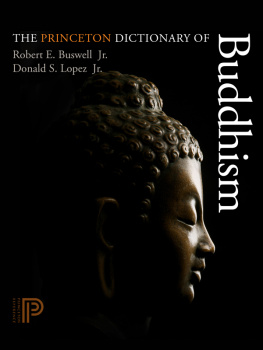Key Concepts in Politics and International Relations
Palgrave Key Concepts
Palgrave Key Concepts provide an accessible and comprehensive range of subject glossaries at under-graduate level. They are the ideal companion to a standard textbook, making them invaluable reading for students throughout their course of study, and especially useful as a revision aid.
Accounting and Finance
Business and Management Research Methods
Business Practice
Criminology and Criminal Justice
Cultural Studies
Drama and Performance (2nd edn)
e-Commerce
Human Resource Management
Information and Communication Technology
Innovation
International Business
Law (2nd edn)
Leisure
Management
Marketing
Operations Management
Philosophy
Politics and International Relations (2nd edn)
Psychology
Public Relations
Social Research Methods
Sociology
Strategic Management
Tourism
Palgrave Key Concepts: Literature
General Editor: Martin Coyle
Contemporary Literature
Creative Writing
Crime Fiction
Literary Terms and Criticism (3rd edn)
Medieval Literature
Modernist Literature
Postcolonial Literature
Renaissance Literature
Romantic Literature
Victorian Literature
Palgrave Key Concepts: Language and Linguistics
Bilingualism
Language and Linguistics (2nd edn)
Phonetics and Phonology
Second Language Acquisition
Further titles are in preparation
www.palgravekeyconcepts.com
Palgrave Key Concepts
Series Standing Order ISBN 9781403932105
(outside North America only)
You can receive future titles in this series as they are published by placing a standing order. Please contact your bookseller or, in the case of difficulty, write to us at the address below with your name and address, the title of the series and the ISBN quoted above: Customer Services Department, Macmillan Distribution Ltd, Houndmills, Basingstoke, Hampshire, RG21 6XS, UK.
KEY CONCEPTS IN POLITICS AND INTERNATIONAL RELATIONS
Second Edition
Andrew Heywood


Andrew Heywood 2000, 2015
All rights reserved. No reproduction, copy or transmission of this publication may be made without written permission.
No portion of this publication may be reproduced, copied or transmitted save with written permission or in accordance with the provisions of the Copyright, Designs and Patents Act 1988, or under the terms of any licence permitting limited copying issued by the Copyright Licensing Agency, Saffron House, 6-10 Kirby Street, London EC1N 8TS.
Any person who does any unauthorized act in relation to this publication may be liable to criminal prosecution and civil claims for damages.
The author has asserted his right to be identified
as the author of this work in accordance with the Copyright, Designs and Patents Act 1988.
First edition (Key Concepts in Politics) 2000
Second edition 2015
Published by PALGRAVE
Palgrave in the UK is an imprint of Macmillan Publishers Limited, registered in England, company number 785998, of 4 Crinan Street, London, N1 9XW.
Palgrave Macmillan in the US is a division of St Martins Press LLC,
175 Fifth Avenue, New York, NY 10010.
Palgrave is a global imprint of the above companies and is represented throughout the world.
Palgrave and Macmillan are registered trademarks in the United States, the United Kingdom, Europe and other countries.
ISBN 978-1-137-48961-6
This book is printed on paper suitable for recycling and made from fully managed and sustained forest sources. Logging, pulping and manufacturing processes are expected to conform to the environmental regulations of the country of origin.
A catalogue record for this book is available from the British Library.
A catalog record for this book is available from the Library of Congress.
For Jean
USES AND ABUSES OF POLITICAL CONCEPTS
Concepts have a particular importance for students of politics and international relations. It is no exaggeration to suggest that political argument often boils down to a struggle over the legitimate meaning of terms. Enemies may argue, fight and even go to war, each claiming to be defending freedom, upholding democracy or supporting justice. The problem is that words such as freedom, democracy and justice have different meanings to different people, so that the concepts themselves come to seem problematic.
At least three reasons can be suggested to explain the unusual importance of concepts in political analysis, whether domestic or international. The first is that political analysis typically deals in generalizations. The significance of this can be highlighted by considering differences between politics and history in this respect. Whereas a historian is likely to want to make sense of a particular event (say, the French Revolution, the Russian Revolution or the Eastern European Revolutions of 198991), a political analyst is more likely to study such events with a view to making sense of a larger or more general phenomenon, in this case the phenomenon of revolution. For historians, a special study of the concept of revolution is of marginal value, because their primary interest is in what is different, even unique, about a particular set of events. For political analysts, on the other hand, a study of the concept of revolution is not only necessary, it is the very process through which political enquiry proceeds.
The second reason is that the language used by students of politics is largely the same as that used by practitioners of politics, and particularly by professional politicians. As the latter are interested primarily in political advocacy rather than political understanding, they have a strong incentive to use language to manipulate and sometimes to confuse. This, in turn, forces students of politics to be especially careful in their use of language. They must define terms clearly and refine concepts with precision to safeguard them from the misrepresentations often current in everyday political debate.
The final reason is that political concepts are frequently entwined with ideological beliefs. Since the emergence of modern political ideologies in the late eighteenth and early nineteenth centuries, not only has a new language of political discourse emerged, but the terms and concepts of political debate have also been imbued with complex, and often conflicting, meanings. Political concepts are therefore particularly challenging creatures: they are often ambiguous and not infrequently the subject of rivalry and debate; and they may come loaded with value judgements and ideological implications of which their users may be unaware.
WHAT IS A CONCEPT?
A concept is a general idea about something, usually expressed in a single word or a short phrase. A concept is more than a proper noun or the name of a thing. There is, for example, a difference between talking about a cat (a particular and unique cat) and having a concept of a cat (the idea of a cat). The concept of a cat is not a thing but an idea, an idea composed of the various attributes that give a cat its distinctive character: a furry mammal, small, domesticated, catches rats and mice and so on. In the same way the concept of presidency refers not to any specific president, but rather to a set of ideas about the organization of executive power. Concepts are therefore general in the sense that they can refer to a number of objects, indeed to any object that complies with the general idea itself.
Next page
